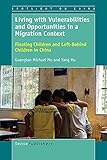Living with vulnerabilities and opportunities in a migration context : floating children and left-behind children in China / Guanglun Michael Mu and Yang Hu.
Material type: TextSeries: Spotlight on China (Rotterdam, Netherlands) ; v. 3.Publisher: Rotterdam ; Boston ; Taipei : Sense Publishers, [2016]Copyright date: ©2016Description: 1 online resource (xxi, 193 pages) : illustrationsContent type:
TextSeries: Spotlight on China (Rotterdam, Netherlands) ; v. 3.Publisher: Rotterdam ; Boston ; Taipei : Sense Publishers, [2016]Copyright date: ©2016Description: 1 online resource (xxi, 193 pages) : illustrationsContent type: - text
- computer
- online resource
- 9789463007856
- 9463007857
- Children of internal migrants -- China -- Social conditions
- Children -- China -- Social conditions
- Rural children -- China -- Social conditions
- Rural-urban migration -- China
- Enfants -- Chine -- Conditions sociales
- Enfants en milieu rural -- Chine -- Conditions sociales
- Exode rural -- Chine
- EDUCATION -- Essays
- EDUCATION -- Organizations & Institutions
- EDUCATION -- Reference
- Children -- Social conditions
- Rural children -- Social conditions
- Rural-urban migration
- China
- 370
- HQ792.C5 M8 2016
| Item type | Home library | Collection | Call number | Materials specified | Status | Date due | Barcode | |
|---|---|---|---|---|---|---|---|---|
 Electronic-Books
Electronic-Books
|
OPJGU Sonepat- Campus | E-Books EBSCO | Available |
Includes bibliographical references (pages 177-190) and index.
Urbanisation and migration: histories, patterns, and challenges -- The wellbeing of floating children and left-behind children: conceptual foundation and empirical knowledge -- Coming into an inheritance: intergenerational social reproduction through class-based pedagogies -- Rural dispositions of floating children in urban fields: accent, deportment, and bodily hexis -- Living with kin caregivers: special needs of children left behind -- Education and personal development of children left behind -- Floating children and left-behind children as resilient agents: a strength-based pathway to wellbeing -- Conclusion: a call for system-level change.
Print version record.
The book grapples with social inequality, inclusivity, and diversity through the discussions of wellbeing, wellbecoming, and resilience of floating children and left-behind children. It invites families, schools, communities, social organisations, and governments to rethink and recognise the qualities of left-behind children and floating children. The book will be of interest to research students, sociologists of education, educational studies scholars, social workers, school professionals, and policy makers in and beyond China. The past two decades have seen exponential growth of urbanisation and migration in China. Emerging from this growth are a myriad population of floating children and left-behind children and the ever greater social-spatial interpenetration that places these children at risk of undesirable wellbeing. The living and schooling of these children are fraught with potholes and distractions in the context of migration and urbanisation. Extant work often treats floating children and left-behind children as two discrete populations and comes to grips with their wellbeing separately. The deficit model and the 'do-gooder' approach have prevailed for a long time, intending to fix the "problems" and correct the "abnormalities" associated with these children. This book differs, however, in its efforts to blur the dichotomy between floating children and left-behind children; in its transformative view and strength-based approach that recast vulnerabilities into opportunities; and in its focus on the nurture of enabling ecologies instead of the nature of individual inferiorities
eBooks on EBSCOhost EBSCO eBook Subscription Academic Collection - Worldwide
There are no comments on this title.

